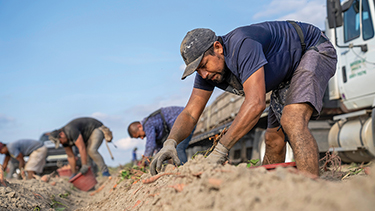Last year was the hottest in recorded history, and this summer is shaping up to be just as bad. In 2023, extreme heat led to the deaths of about 11,000 people in the U.S. alone.
Knowing how to stay safe and healthy in extreme heat can literally be lifesaving.
Extreme heat and rising global temperatures can cause or worsen many health problems, including cardiovascular and respiratory illnesses and mental distress.
As temperatures rise from human-caused global warming, people with allergies are enduring longer allergy seasons. Warmer climates also mean wider ranges for disease-carrying insects such as ticks and mosquitoes, which spread many infectious diseases.
Who is at risk?
Some people are at higher risk of serious health complications from extreme heat. Children, older adults, people who are experiencing homelessness, and those who work outdoors are at a greater risk of dehydration, heat stroke and other heat-related conditions. People who live in cities can experience the urban heat island effect, which happens when treeless areas with dark buildings and paved areas absorb and give off heat, raising outdoor temperatures to dangerous levels.
People who live in urban areas — particularly low-income households and people of color whose neighborhoods have received fewer investments in parks and green spaces — are disproportionately affected by extreme heat and the health outcomes it can bring.
What can I do?
It’s important to protect your health during periods of intense heat. That includes staying hydrated and staying indoors, if possible.
People who work outdoors should take frequent water breaks, stay in the shade and use sun protection. Also, check to see if you city or region has cooling centers.
Tools are available to help assess upcoming heat-related health risks, which may help when planning outdoor activities. The Centers for Disease Control and Prevention recently partnered with the National Oceanic and Atmospheric Administration’s National Weather Service to start the Heat and Health Initiative. The initiative combines weather forecasting technology with information about health risks, as well as guidance for health professionals, and provides clear information searchable by ZIP code.
Advocates can also make a difference by asking leaders to support infrastructure such as reflective roofs, cool pavement and solar power to reduce the urban heat island effect.
APHA’s Center for Climate, Health and Equity has resources to advocate for protecting public health from the effects of climate change.
Use our action alerts to let your congressional representatives know that public health is important to you and your community. Hold your elected officials accountable for mitigating climate change — and consider candidates who prioritize climate, health and equity in policymaking when it’s time to vote.
Photo by Mark Stenick, courtesy iStockphoto